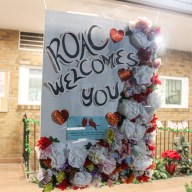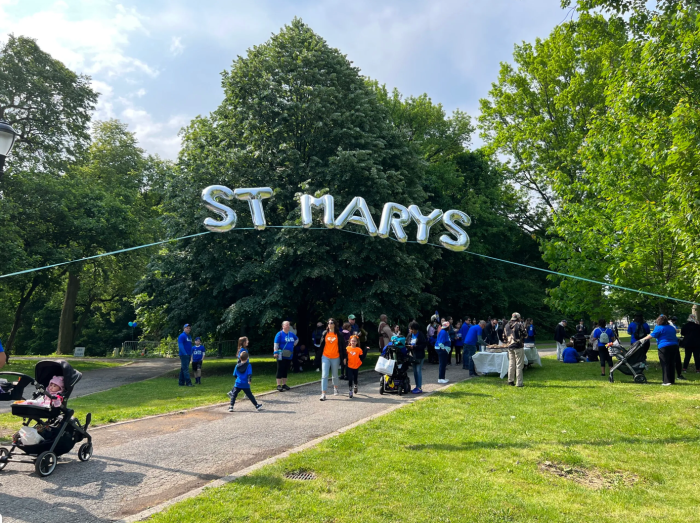By Alexander Dworkowitz
The decorations around Kathleen Newhook's bed look like almost any other at Coler-Goldwater Specialty Hospital and Nursing Facility on Roosevelt Island.
Balloons are scattered against her wall. Her cabinet is covered in cards, one of which she made in the hospital's computer class for her 27-year-old son, Jason. But unlike her fellow patients, Newhook keeps a bag of metal soda cans beside her bed.
“I guess I do it here out of habit,” Newhook said.
For eight years Newhook lived in Flushing Meadows Corona Park, often collecting cans for recycling to help her get by. In December, she slipped on ice on her way to do laundry and was admitted to the hospital with a broken leg.
“The broken leg is a lesson,” she said. “They say I can stay as long as I want.”
The daughter of a slaughterhouse worker, Newhook, 47, grew up in a Catholic home in Woodside. At the age of 19, she got pregnant and married her boyfriend. They divorced a week later.
Staying at home, she raised her son.
As she grew older, Newhook left her teenage son with her mother and brother in Woodside and moved to Astoria.
But in 1994, the diner where Newhook worked closed. At the same time, her roommate moved out of her apartment, and she could no longer afford the rent. Since she did not get along with her mother, she decided she could not go home.
Newhook found a low-paying job, cleaning up Flushing Meadows for the city Parks Department. After losing her Astoria apartment, she spent a night at a shelter in Brooklyn and hated it.
After work the next day in the park, she decided to spend the night there. She did not sleep on a bed again for nearly a decade.
Newhook spent most of her nights sleeping next to the bathroom at the northern end of the park.
“That bathroom has been great to me, I'll tell you,” she said. “I still have stuff in there I need to pick up. In the winter, usually I'm in that bathroom all day.”
Newhook hid her homelessness from the Parks Department for several years, sometimes sleeping in their vehicles, she said. She eventually lost her job.
In talking about her time in the park, Newhook played down her material problems, and even described some of her days with nostalgia.
In the summer, Newhook would often visit the Queens Zoo, located in the park.
“I loved my animals,” Newhook said. “I had my pet raccoons. My coons loved peanut butter sandwiches.”
In the winter, she would wrap herself in layer upon layer of blankets and five pairs of pants to get by.
Her $130 monthly food stamps check gave her enough food to survive, although she often went days without eating. Her welfare money was sometimes cut off, but when it came it often allowed her to buy soap, clothing, beer and makeup, which she still applies liberally everyday.
Newhook said she would drink a six-pack of beer every once in awhile, but contended she did not have a problem with alcohol or drugs.
But as one of the few women who lived in the park, Newhook said her worst experiences in Flushing Meadows involved not food, clothing or shelter but men.
In the summer of 2001, another homeless man in the park tried to rape her in the middle of the night, Newhook said.
“He had a broken bottle,” Newhook said. “He put it up to my neck.”
A friend of hers came by and wrestled the man off her, Newhook said. She told the police about the attacker, who now is serving time in prison based on other charges, she said.
For almost her entire time living in the park, Newhook dated a man who often physically abused her, she said. Although the man had a home in Harlem, he would often spend the night with her.
Finally in December 2001 Newhook started seeing a homeless man in the park, Ricardo Rivera, for protection, she said. But another homeless man, Jose Rojas, fell in love with her, she said.
One December evening, a drunken Rojas hit Rivera with a board, and Rivera came to Newhook frantically searching for a baseball bat, she said.
“Ricardo came back to me crazy, saying, 'I'm going to kill him, I'm going to kill him,' ” she said.
Rivera found the bat, returned to Rojas and attacked him, according to police. Rojas died in the hospital three days later. Rivera pleaded guilty to manslaughter in July and is serving a 13-year sentence.
In her life in the park, Newhook's encounters with the police were frequent.
Last February, she was detained by police for questioning after a Parks Department worker found a fetus stuffed into a vent in the bathroom where she spent her time.
Police sometimes awakened Newhook in the middle of the night, asking her to find another place to sleep. Newhook said they came by more often after Mayor Michael Bloomberg took office.
“They didn't bother me too much. They do their job. I don't blame them,” she said.
Nowadays Newhook does not worry about being roused in the middle of the night, being attacked or going hungry.
She called her stay at the hospital a blessing. She has become reacquainted with her son, who visited her in the hospital. Newhook said she is soon in line for public housing and hopes to get a cleaning job reserved for victims of domestic violence.
“I'm going to get it,” she said confidently. “I'm going to get it.”
Reach reporter Alexander Dworkowitz by e-mail at Timesledger@aol.com or call 1-718-229-0300, Ext. 141.






























